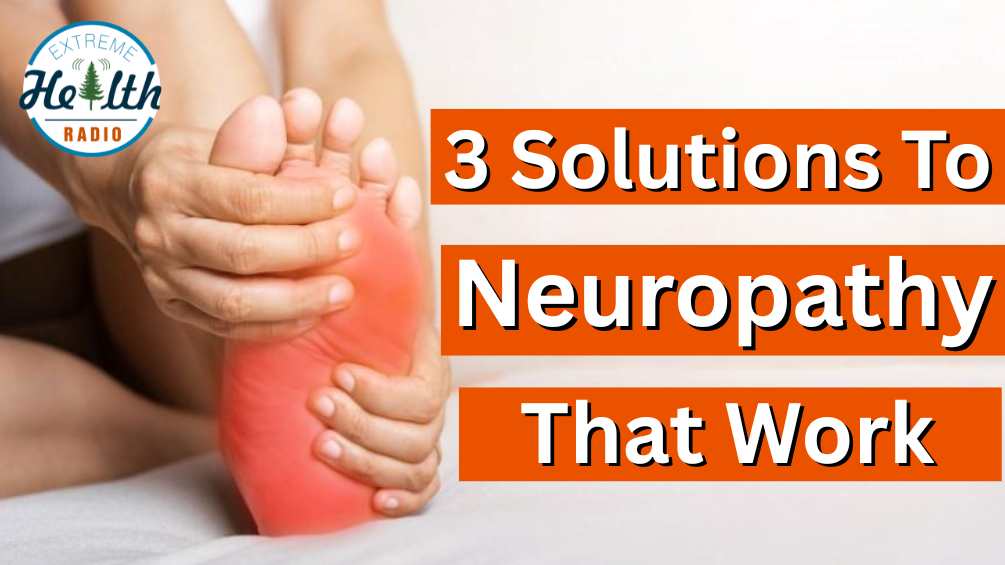
About 3 weeks ago somebody asked me about neuropathy in their hands and I gave them the standard answer (see below). Then the next day I started having the exact same sensations myself.
First it was my fingertips then a day later it moved a little higher up and I started to get worried that I had diabetes. Then I took some of the supplements I shared below, made some changes and sure enough the next day it was gone.
It hasn’t come back since.
I feel sometimes life or God allows these things to happen to us just so that we never lose perspective of needing help ourselves.
I’m always the one sharing with friends or family all the natural cures and remedies for situations.
When I do this, I sometimes feel like I don’t have enough empathy. Mentally I’m aware of that. I’ll think to myself “I’m sharing the studies and research on natural remedies for neuropathy but thank God I don’t have that!”.
It’s weird to be aware of the fact that you’re giving health advice for something you’ve never experienced. Until you do.
Anyway, you’re not here to hear my stories you’re here to get some natural remedies for neuropathy that your doctor probably doesn’t know about.
All they know is pharmaceutical medications and prescription drugs (which all have dangerous effects on your body). Why they don’t know what I know is for another article entirely. I won’t get into that here.
But first…
What is Neuropathy?
Neuropathy, also known as peripheral neuropathy, is basically a condition resulting from damage to the peripheral nerves (those nerves which are anywhere outside of your brain and spinal chord), which are pretty much responsible for transmitting signals between the central nervous system (aka CNS, brain and spinal cord) to the rest of your wonderfully made body.
Peripheral neuropathy can affect sensory, motor, or autonomic nerves, leading to a bunch of different symptoms depending on which of your nerves are damaged.
Each person has different sensations.
How Prevalent is Neuropathy?
Neuropathy is a pretty widespread health condition. To one degree or another, it affects millions of people around the world every year. For reference in these here United States alone, roughly 20 million people suffer from it.
Among all the forms or neuropathy, I see diabetic peripheral neuropathy as the most common. 70% of folks with type II diabetes also have neuropathy. In contrast, neuropathy occurs much less frequently in adults without diabetes.
The two (diabetes and neuropathy) pretty much go hand in hand. Just note, there are remedies for diabetes that you should know about.
And get this, in America roughly 10% of us have diabetes, and another 33% (that’s one in three adults my friends) has prediabetes and doesn’t even know it. So 43% of adults in America have some form of diabetes and are on the road to peripheral neuropathy.
What Causes Neuropathy?
This is the age old question and I get this one a lot.
Neuropathy can result from many different causes, including diabetes, infections, toxins, nutritional deficiencies, and even some autoimmune diseases.
In my opinion getting to the root cause is absolutely critical to not just manage the condition but finding a natural remedy that cures it once and for all.
I’ve found that natural remedies, when used the right way, can not just alleviate symptoms and support nerve health but actually turn this condition around. Something most doctors will not tell you. They’ll disempower you by saying “there are no natural remedies for neuropathy and the best you can do is to get on a medication.”
I’ve heard this many times before.
There are other factors that play a role of course like alcohol abuse, polyunsaturated fatty acid consumption, chemotherapy drugs, hereditary diseases, and vitamin B12 deficiency, also play a pretty large role in its development. Although these factors do make neuropathy a pretty significant health concern, that’s not a death sentence.
You can heal if you do the right things and make the right changes to your diet, environment, supplement routine, habits and lifestyle.
We’ll get into some of them later.
But first do you suffer with these…
Symptoms of Neuropathy
- Sensory Symptoms:
- Tingling or “pins and needles” sensations.
- Numbness, especially in the hands and feet.
- Burning or sharp, stabbing pain.
- Heightened sensitivity to touch (allodynia).
- Motor Symptoms:
- Muscle weakness.
- Difficulty with coordination or balance.
- Muscle cramps or twitching.
- Autonomic Symptoms:
- Changes in blood pressure or heart rate.
- Digestive issues, such as constipation or diarrhea.
- Excessive sweating or inability to sweat.
If you do suffer with these conditions and have not been officially diagnosed with diabetes, it’s possible you have prediabetes which we’ll need to correct through positive life changes.
3 Natural Remedies For Neuropathy
The first thing I want you to know is that natural remedies isn’t “alternative health”. Alternative health is what the Rockefeller foundation did through the Flexner report in 1910 that solidified oil based drugs to be the new standard of care. When in reality the original standard of care was natural remedies and holistic treatments of diseases for thousands of years before we invented the pharmaceutical industrial complex that rules everything today.
Natural remedies work and living closer to nature is always the solution to every disease, including neuropathy, diabetes, cancer, strokes, heart attacks and every other disease.
So let’s get right into it, shall we?
1. Alpha Lipoic Acid (ALA)
- Effectiveness: Alpha lipoic acid is an extreme potent antioxidant that has been extensively studied for its ability to relieve symptoms of diabetic neuropathy. It’s always my “go to” whenever somebody asks about natural remedies for neuropathy. It works by reducing oxidative stress, improving nerve function, and alleviating pain.
- Research Evidence: Studies I’ve read have shown that both intravenous and oral administration of ALA (600 mg daily for three weeks) significantly reduces neuropathic pain and other symptoms compared to a placebo. I prefer oral as my first option and if oral isn’t getting the job done, move up to IV.
- Additional Benefits: ALA is an approved treatment for diabetic neuropathy in Germany and has been highlighted as one of the most effective non-drug options for pain relief.
2. Vitamin B Complex:
- Effectiveness: B vitamins, particularly B1 (thiamine), B6, and B12, are mission critical for normal nerve function. If you have deficiencies in these vitamins (consume a high sugar diet with PUFAs), you might be on the path to getting neuropathy. I like to take a whole B complex and then isolated B vitamins on top of that.
- Research Evidence: Vitamin B12 deficiency is a well-known risk factor for nerve damage, and supplementation can provide sustained improvements in pain and sensation. Low levels of B1, B6, and folate are also linked to neuropathy, making a B-complex supplement a vital part of treatment. The trick with B12 is if you’re over 60, I recommend getting B12 injections as most people don’t have enough stomach acid to create the “intrinsic factor” that makes B12 absorbable.
- Additional Benefits: These vitamins not only support your nerve health but also help prevent further damage, especially in people with diabetes or are high risk (prediabetes).
3. Primrose Oil:
- Effectiveness: Primrose oil, rich in gamma-linolenic acid (GLA), has been shown to reduce neuropathic pain and improve nerve function.
- Research Evidence: A double-blind, placebo-controlled trial demonstrated that taking 4 to 6 grams of primrose oil daily led to significant pain relief in diabetics with peripheral neuropathy after six to twelve months.
- Additional Benefits: This natural remedy is particularly effective for long-term management and can be combined with other therapies for enhanced results.
These remedies not only alleviate symptoms but also promote nerve regeneration and overall nerve health.
Conclusion
As you can see these are my top 3 most effective natural remedies for neuropathy. But remember it does zero good to continue living the exact way you are now, but take B12 injections or start taking ALA. You absolutely must stop eating PUFAs, avoid blue light (something I talk a lot about but haven’t mentioned in this article), lower your consumption of processed foods and follow a healthier diet.
If I had this condition or thought I had diabetes, I’d follow my Diabetes Protocol (obviously) but also consider a Keto or Carnivore diet and start blocking blue light, avoiding PUFAs and begin taking some of the supplements mentioned above.
I’d give it 30 days and test to see where I’m at.
Questions:
- Does diabetes run in your family?
- Do you eat too much processed foods or sugar?
- Have you tried any natural remedies for neuropathy? Have they worked?
Comment below!


